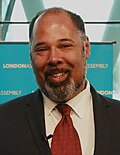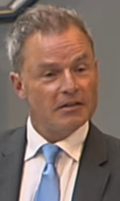
The UK Independence Party is a Eurosceptic, right-wing populist political party in the United Kingdom. The party reached its greatest level of success in the mid-2010s, when it gained two members of parliament and was the largest party representing the UK in the European Parliament. The party is currently led by Nick Tenconi.
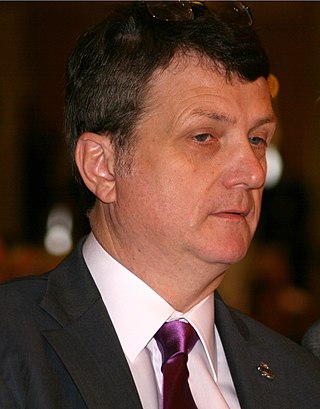
Gerard Joseph Batten is a British politician who served as the Leader of the UK Independence Party (UKIP) from 2018 to 2019. He was a founding member of the party in 1993, and served as a Member of the European Parliament (MEP) for London from 2004 to 2019.

David Campbell Bannerman is a British politician who served as Member of the European Parliament (MEP) for the East of England from 2009 to 2019. He is currently Chairman of the Conservative Democratic Organisation and The Freedom Association. A member of the Conservative Party, he previously served as Deputy Leader of UK Independence Party (UKIP) from 2006 until 2010, when he was replaced by Paul Nuttall.
James Bruce Carver is a British politician who served as a Member of the European Parliament (MEP) for the West Midlands region between 2014 and 2019. He was elected in 2014 for the UK Independence Party, second on the list for the region, being elected together with Jill Seymour and Bill Etheridge. He resigned from UKIP in May 2018.

Paul Andrew Nuttall is a British politician who served as Leader of the UK Independence Party (UKIP) from 2016 to 2017. He was elected to the European Parliament in 2009 as a UK Independence Party (UKIP) candidate, and served as a Member of the European Parliament (MEP) for North West England between 2009 and 2019, sitting in the Europe of Freedom and Direct Democracy group. He left UKIP in December 2018, criticising the party's association with far-right activist Tommy Robinson, and joined the Brexit Party in 2019.

Jonathan William Arnott is a British politician and former schoolteacher. After the 2014 European Parliament election, he served as a Member of the European Parliament (MEP) for the North East England region. Originally sitting as a UK Independence Party (UKIP) representative, he resigned from the party on 19 January 2018 to sit as an independent until designating as Brexit Party on 17 April 2019.
Margaret Lucille Jeanne "Margot" Parker is a British former politician who served as a Member of the European Parliament (MEP) for the East Midlands region between 2014 and 2019.

Diane Martine James is a British politician who was a Member of the European Parliament (MEP) for South East England from 2014 to 2019. She was briefly leader-elect of the UK Independence Party (UKIP) from September 2016 to October 2016, but resigned before formalising her leadership. At the time of her election to the European Parliament, James was one of three UKIP MEPs for South East England, before joining the Brexit Party in 2019.
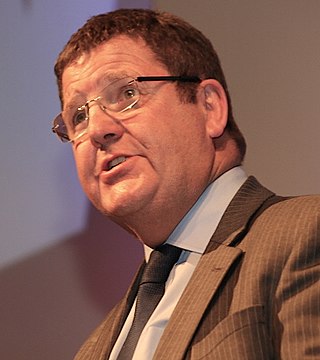
Michael Hookem is a British politician who served as Member of the European Parliament (MEP) for Yorkshire and the Humber from 2014 to 2019.

William Milroy Etheridge is an English politician who was previously a Member of the European Parliament (MEP) for the West Midlands region. He was elected in 2014 as a UK Independence Party (UKIP) candidate, but left the party in October 2018 and joined the Libertarian Party. He joined the Brexit Party in 2019 but rejoined UKIP in September 2020. He unsuccessfully stood for UKIP leader in 2016, and 2024.
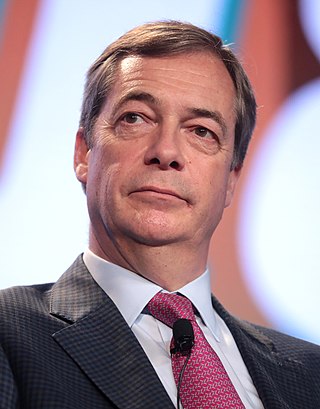
The 2019 European Parliament election was the United Kingdom's component of the 2019 European Parliament election. It was held on Thursday 23 May 2019 and the results announced on Sunday 26 and Monday 27 May 2019, after all the other EU countries had voted. This was the United Kingdom's final participation in a European Parliament election before leaving the European Union on 31 January 2020; it was also the last election to be held under the provisions of the European Parliamentary Elections Act 2002 before its repeal under the European Union (Withdrawal) Act 2018, and was the first European election in the United Kingdom since 1999 to be held on a day that did not coincide with any local elections. This was the first of two national elections held in the United Kingdom in 2019; the 2019 general election occurred six-and-a-half months later in December 2019.

Peter Robin Whittle is a British politician, author, journalist and broadcaster who served as a Member of the London Assembly from 2016 to 2021 and as Deputy Leader of the UK Independence Party (UKIP) to Paul Nuttall from 2016 to 2017. He is the founder and director of the New Culture Forum think tank and host of So What You're Saying Is..., a weekly cultural and political interview show on YouTube.

Henry David Bolton is a former British politician who was the leader of the UK Independence Party (UKIP) from 29 September 2017 to 17 February 2018. He served in the British Army, attaining the rank of lance corporal, and went on to reach the rank of captain following his transfer to the Territorial Army from the Regular Army. Bolton has also served as a police officer.

Anne Marie Dorothy Waters is a far-right politician and activist in the United Kingdom. She founded and led the anti-Islam party For Britain until its dissolution in 2022. She is also the director of Sharia Watch UK, an organisation launched in April 2014. In January 2016, Waters launched Pegida UK in conjunction with activist Tommy Robinson and far-right politician Paul Weston.

David Michael Kurten is a British politician who has served as leader of the Heritage Party since September 2020. He was previously a member of the London Assembly (AM) for Londonwide from 2016 to 2021. Elected as a UK Independence Party (UKIP) candidate, he subsequently left the party in January 2020. He is the registered leader of the Heritage Party and characterises himself as a social conservative.
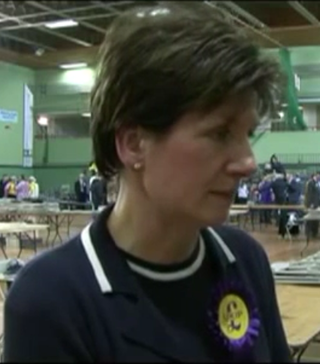
The September 2016 UK Independence Party leadership election was triggered after Nigel Farage, the leader of the UK Independence Party, announced on 4 July 2016, following the Leave result in the UK referendum on EU membership, that he would step down when a new leader had been elected.
The November 2016 UK Independence Party leadership election took place following the announcement on 4 October 2016 by Diane James, the leader-elect of the UK Independence Party, that she would not accept the leadership of the party, despite winning the leadership election 18 days earlier. Nigel Farage, whom James was to succeed after the previous leadership election following his resignation, was selected the next day to serve as interim leader.
The 2018 UK Independence Party leadership election was triggered after members voted to remove Henry Bolton as leader of the UK Independence Party at an extraordinary general meeting held in Birmingham on 17 February 2018. It was the fourth UKIP leadership election in eighteen months. Interim leader Gerard Batten was ultimately elected unopposed as the party's new leader.
The 2019 UK Independence Party leadership election took place following the departure on 2 June of Gerard Batten from the leadership of the UK Independence Party. The result was announced on 10 August 2019, with Richard Braine being elected to lead the party. This was the party's fifth leadership election in three years. Braine resigned just two months later, triggering a sixth leadership election.







